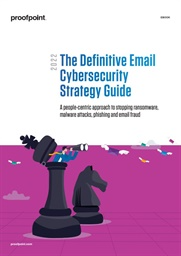The Definitive Email Cybersecurity Strategy Guide
Email is your most essential business tool—and today's top malware delivery vector. This vital communications channel has become fertile ground for today's most damaging cyber threats and all kinds of fraud. Because email threats inherently target people, an effective cybersecurity program focuses on people first. The 2022 edition of our Definitive Email Security Strategy Guide provides a detailed look at the latest email threats and how you can manage them with a people-centric approach. In our Definitive Email Security Strategy Guide you'll learn: Why email should be your No. 1 security priority. What makes it so difficult to protect email. Who's being targeted by business email compromise (BEC) and email account compromise (EAC). How people-centric security is more effective—and more cost-effective—than perimeter-based defences
Read More
By submitting this form you agree to Proofpoint contacting you with marketing-related emails or by telephone. You may unsubscribe at any time. Proofpoint web sites and communications are subject to their Privacy Notice.
By requesting this resource you agree to our terms of use. All data is protected by our Privacy Notice. If you have any further questions please email dataprotection@techpublishhub.com
Related Categories: Data Loss Prevention (DLP), DMARC, Email Security, Encryption, Firewall, Identity Management, Incident Response, Threat Intelligence


More resources from Proofpoint

The Data Breach is Coming from Inside the House
Real-Life Tales of Data Loss, Insider Threats and User Compromise
Data doesn't lose itself. People lose it. But in today's distributed, cloud...

The Top 10 Biggest and Boldest Insider Threats
Over the last two years alone, insider security incidents have jumped 47%, with the average cost per incident up 31%. That risk is only increasing ...

Three Reasons to Move from Legacy DLP
Changing your data loss prevention (DLP) solution is a major transition that can feel overwhelming. But relying on DLP built for an earlier era of ...

